The Ministry of Foreign Affairs (MOFA) yesterday expressed regret over the US and UK's reiteration of their opposition to Taiwan's planned referendums on its UN membership bid.
"It is regrettable that two strong democratic countries such as the US and the UK would oppose Taiwan exercising its democratic values," ministry spokeswoman Phoebe Yeh (葉非比) said, stressing the referendums would not unilaterally change the "status quo" as Washington has repeatedly alleged.
US Secretary of State Condoleezza Rice told reporters in Beijing yesterday that "Taiwan is a democratic entity that will have to make its own decisions, but I think we have been very clear that we think that this referendum is not going to help anyone and in fact it shouldn't be held."
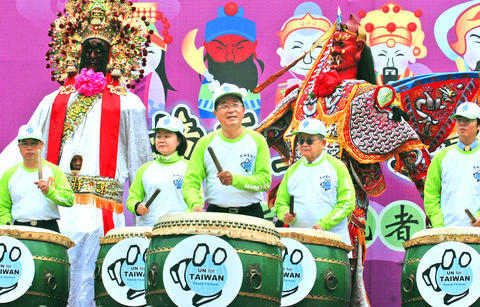
PHOTO: CHIANG YING-YING, AP
British Foreign Secretary David Miliband, who will arrive in Beijing today, also panned Taipei for the referendums, scheduled to be held with the presidential election on March 22.
"We don't support the use of the referendum as a way for Taiwan to join the UN in the name of Taiwan," he told students at the China Europe International Business School in Shanghai yesterday.
Miliband encouraged governments on both sides of the Taiwan Strait to hold dialogue to resolve their differences by using next month's presidential election as a chance to mend ties.
"We think that actually after the March election in Taiwan, there needs to be an attempt from both sides to try to boost dialogue, to try to reduce the amount of tension in the Taiwan Strait," he said.
Meanwhile, President Chen Shui-bian (陳水扁) has ruled out mounting a "defensive referendum" during the election and urged the public to support the two referendums on UN membership.
"As a sign of respect to all those who endorsed the two referendum proposals, I hereby solemnly declare that I will not launch a `defensive referendum' on the UN issue," he said yesterday.
"I am calling on the Taiwanese public, regardless of their political affiliation, to support Taiwan, protect this country and help the two referendums succeed," Chen said.
The president made the comments during a public relations event to announce a series of parades to drum up support for the Democratic Progressive Party's (DPP) referendum proposal.
The 13-day event will begin in Keelung tomorrow and end in Sanchong (
The DPP has proposed holding a referendum on joining the UN under the name "Taiwan," while the Chinese Nationalist Party (KMT) would "rejoin" the world body using the country's official name -- the Republic of China (ROC) -- or any other "practical" title that would uphold the country's dignity.
Speculation has mounted that Chen was considering launching a "defensive referendum" in accordance with Article 17 of the Referendum Law (公投法), which stipulates that the president may, following a resolution by the Executive Yuan, place national security matters before the public in a referendum when the nation is exposed to an external threat.
A defensive referendum does not require the consent of the legislature but simply ratification by the Executive Yuan.
Chen said that holding the referendums alongside elections saves on manpower and costs and would not benefit a particular party or create tensions as the country has held two referendums before.
"If the referendums benefit anyone, it is the two sets of candidates," Chen said. "I am asking all political parties to help protect Taiwan's spirit and uphold the public will to join the international body. Let's create a win-win situation for the country, the people and our children."
Chen urged the public to vote wisely on election day and send the message that the 23 million people of Taiwan would like to become a member of the global organization.
"God helps those who help themselves," he said.
In related news, academics yesterday urged the KMT not to boycott the referendums because a failure to pass both referendums could be interpreted as Taiwan's indifference to joining international organizations.
Liu Shih-chung (劉世忠), vice chairperson of the Ministry of Foreign Affairs' Research and Planning Committee said that if neither the KMT or the DPP referendum passes the initial threshold of 50 percent of voter turnout, it would send a message to the international community that the people of Taiwan do not care about participating in world bodies and provide ammunition to countries that oppose Taiwan's international stance.
However, if either one of the referendums -- or both -- were to pass, Taiwan-friendly countries could use the result to justify their support -- or their abstinence -- on the Taiwan issue when it is put to the floor of the UN General Assembly, he said.
Lai I-chung (
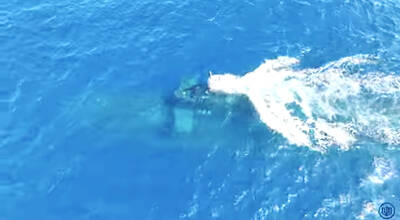
CSBC Corp, Taiwan (台灣國際造船) yesterday released the first video documenting the submerged sea trials of Taiwan’s indigenous defense submarine prototype, the Hai Kun (海鯤), or Narwhal, showing underwater navigation and the launch of countermeasures. The footage shows the vessel’s first dive, steering and control system tests, and the raising and lowering of the periscope and antenna masts. It offered a rare look at the progress in the submarine’s sea acceptance tests. The Hai Kun carried out its first shallow-water diving trial late last month and has since completed four submerged tests, CSBC said. The newly released video compiles images recorded from Jan. 29 to
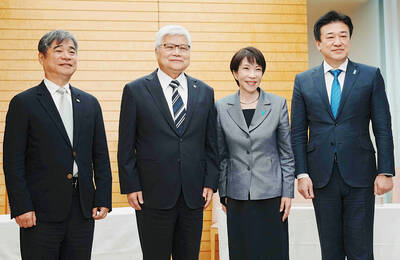
Taiwan Semiconductor Manufacturing Co (TSMC, 台積電) plans to make advanced 3-nanometer chips in Japan, stepping up its semiconductor manufacturing roadmap in the country in a triumph for Japanese Prime Minister Sanae Takaichi’s technology ambitions. TSMC is to adopt cutting-edge technology for its second wafer fab in Kumamoto, company chairman C.C. Wei (魏哲家) said yesterday. That is an upgrade from an original blueprint to produce 7-nanometer chips by late next year, people familiar with the matter said. TSMC began mass production at its first plant in Japan’s Kumamoto in late 2024. Its second fab, which is still under construction, was originally focused on
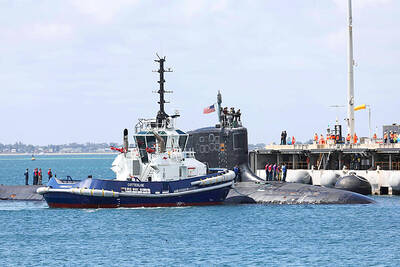
DETERRENCE EFFORTS: Washington and partners hope demonstrations of force would convince Beijing that military action against Taiwan would carry high costs The US is considering using HMAS Stirling in Western Australia as a forward base to strengthen its naval posture in a potential conflict with China, particularly over Taiwan, the Wall Street Journal reported on Saturday. As part of its Indo-Pacific strategy, Washington plans to deploy up to four nuclear-powered submarines at Stirling starting in 2027, providing a base near potential hot spots such as Taiwan and the South China Sea. The move also aims to enhance military integration with Pacific allies under the Australia-UK-US trilateral security partnership, the report said. Currently, US submarines operate from Guam, but the island could
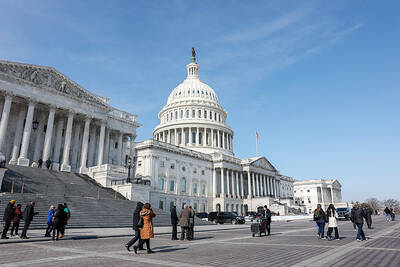
The partisan standoff over President William Lai’s (賴清德) proposed defense budget has raised questions about the nation’s ability to adequately fund its own defense, the US Congressional Research Service (CRS) said in a report released on Tuesday. The report, titled Taiwan: Defense and Military Issues, said the government has increased its defense budget at an average annual rate of 5 percent from 2019 to 2023, with about 2.5 percent of its GDP spent on defense in 2024. Lai in November last year proposed a special budget of about US$40 billion over eight years, and said he intends to increase defense spending to